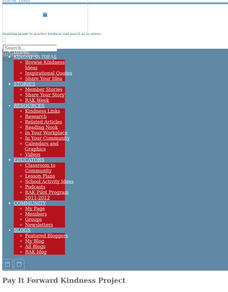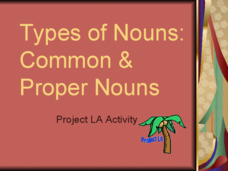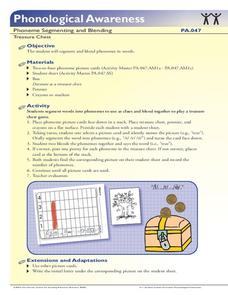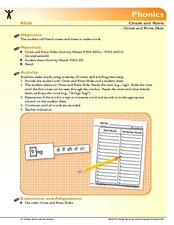Curated OER
Unique Monique: Building a Community of Unique Individuals
Young scholars recognize that each student is unique and has special talents. Students develop a puzzle piece that describes them and their particular talents. Young scholars share their pieces and post on a bulletin board.
Curated OER
Simulated Air Trip to Seoul, Korea
Students become acquainted with the geography and culture of Korea. In this Korean trip lesson, students view a video about Korea and read about the country. Students sample snacks and possibly learn a Korean phrase as they participate...
Curated OER
Martin Luther King Jr. and Nonviolence
Using the book, Martin's Big Words, learners will discover the life of Dr. Martin Luther King Jr. Vocabulary is identified throughout the story by using several his famous protest speeches as examples. Class discussions on racism, during...
Curated OER
Community Helpers
The book, Doctor Ted is used to kick off this lesson on Community Helpers. Young learners make connections to their own life by dictating a story of their own, and inventing other jobs that Ted can do.
Curated OER
Pay It Forward Project
Create a list of random acts of kindness and have your class perform them during a designated week. Learners will also participate in a project centered around being kind to others. Each grade chooses their kindness project, and then...
Curated OER
Chrysanthemum
Our uniqueness should be celebrated, not teased. The story Chrysanthemum addresses having a distinct name and dealing with different perceptions. Pre- and post-reading questions are listed to help your learners understand and make...
Curated OER
Questioning
Practice making predictions by looking at the cover of a book. You can use The Hungry Thing, as suggested here, or any other book you may be reading in class. Use the predictions to talk about good reading strategies. A chart is included...
Curated OER
Guided Reading with Elizabeti's Doll
Practice reading strategies using Elizabeti's Doll by Stephanie Stuve-Bodeen. Readers utilize decoding and comprehension strategies before, during, and after reading the story. A detailed list of text features, high frequency words,...
Curated OER
What Do You See at the Pond?
With What Do You See at the Pond?, young readers explore pond life and practice reading strategies. Learners first make predictions and then read the simple story independently. After a second read-through with a partner, kids come...
Curated OER
Using a Title to Determine the Main Idea
Use the title of a book to determine the main idea. Readers will view the cover of The Wedding and predict what the story will be about. Graphic organizers help chart important information and build new vocabulary. Other stories are used...
Curated OER
Do You Want to Be My Friend?
Learners participate in a variety of emergent and early-literacy activities based on a "friendship" theme. Learners listen to the book Do You Want to Be My Friend by Eric Carle, then echo read, choral read, and independently read...
Curated OER
The Little Red Hen
Young readers access prior knowledge of how wheat becomes bread. Using "The Little Red Hen" story, learners make predictions of the events. Extension activities include singing a song about the story and making a list of ways to help...
Curated OER
Types of Nouns: Common & Proper Nouns
Elementary school students often falter when asked to distinguish between a common and proper noun. Even older students may not be sure. This presentation provides a comprehensive review of nouns. Great fun!
Curated OER
Mapmaker, Make Me a Map!
Here is a well-designed, very thorough lesson plan on mapping for very young children. Within the six-page plan, you will find everything you need to implement the activity. They will identify various landforms found in Colorado on a...
Curated OER
Honey Bees and Communication
Did you know that honey bees dance to communicate information? Do you know why bees use hexagons to build their hives? The Honeybee Man, Brilliant Bees, and Show me the Honey provide background information on how honey bees communicate....
Curated OER
Creating Supporting Characters
Supporting characters need detail and characteristics just like a main character. Keep your budding authors entrenched in detail as they write their novels. This lesson focuses on developing supporting characters using personal...
Florida Center for Reading Research
Letter Recognition: Poetry Pen
It's always nice to have a great idea and all the tools to make it happen. The class can use these nursery rhyme and alphabet cards to teach each other letter recognition and letter sound correspondence. There is a full set of alphabet...
Florida Center for Reading Research
Letter-Sound Dominoes
What do dominoes and phonemes have in common? Quite a bit in this engaging phonics game! Each domino has a letter on one side and an image on the other. Everything you need is here; partners place the starting domino on the table then...
Florida Center for Reading Research
Rhyming A-LOT-OH!
Rhymes are a great way to help your scholars with phonemic awareness and word relationships. Kids work with partners to match cards from a stack to their rhyming counterparts on a game board. There are six different boards, so this will...
Florida Center for Reading Research
Rhyme Flip Book
This rhyme book activity may look confusing at first, but it's really quite simple. Everything you'll need is right here and ready to use. Kids cut out and staple the pages of their own rhyme books. The only folds they will make are the...
Florida Center for Reading Research
Syllable Hopscotch
Let your little learners move while they practice breaking words into syllables or chunks. Place a hopscotch "board" on the floor (this can be done with tape). Your class takes turns choosing picture cards, and then they say the name of...
Florida Center for Reading Research
Sound Spin
Here is a phoneme segmenting game which incorporates drawing for your more artistic learners. Assemble the spinner using a brad and lay out the picture cards face up. Partners take turns spinning to get either two, three, four, or five....
Florida Center for Reading Research
Treasure Chest
Segmenting and blending phonemes helps budding readers understand words. Use this strategy in an engaging game where partners test each other's auditory processing using familiar words. Using picture cards and a chart (included),...
Florida Center for Reading Research
Onset and Rime Slide
Discover onset and rime blends using this interactive activity which will appeal to your kinesthetic learners. Using the sliding templates provided, budding readers try different onsets with each rime. They practice reading skills by...
Other popular searches
- English Language Arts Exam
- English Language Arts Games
- Deaf English Language Arts
- English Language Arts Music
- English Language Arts Heroes
- English Language Arts Skills
- Language Arts English
- English Language Arts Grade 3
- English Language Arts Poetry
- English Language Arts Rating=3
- English Language Arts Unit Sc
- Language Arts or English

























